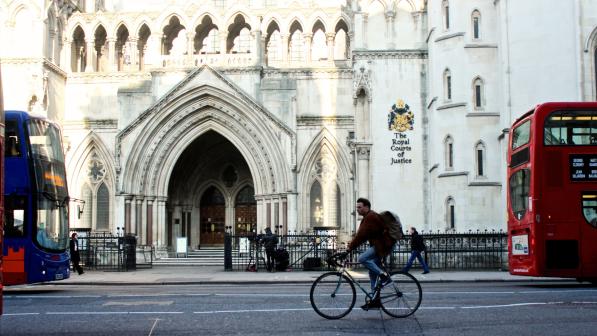Human cost of exceptional hardship loophole needs to close says Cycling UK
- Loophole allows drivers who have accrued 12 penalty points on their licence to avoid a driving ban by claiming it would cause them “exceptional hardship”
- More than 83,000 drivers in the past 10 years have escaped disqualification due to “mitigating circumstances”
- Cycling UK report published in 2021 highlights case studies of drivers who used the loophole to escape bans despite a history of driving offences, and who went on to injure or kill road users
Cycling UK today (9 October) has renewed its call on the government to close the loophole in the law which allows people to escape driving bans, and which has resulted in the death and serious injury of other road users.
Currently people driving who have accrued 12 penalty points on their licence, which would normally result in a temporary driving ban due to ‘totting up’, can avoid a ban by claiming it would cause them “exceptional hardship”. Cycling UK has calculated more than 83,000 drivers with 12 points or more have escaped disqualification in the past 10 years.
In October 2020, the Sentencing Council issued guidance for magistrates which was intended to reduce the number of offenders with totting up offences who avoided disqualification.
As reported in the Sunday Times today, since those changes, the Sentencing Council says it has been suggested by some magistrates and legal advisers that courts are too often imposing short discretionary disqualifications (of less than 56 days) where people have received 12 or more points.
Duncan Dollimore, Cycling UK’s head of campaigns, said: “The Sentencing Council’s report shows we now have a loophole within a loophole. The result is people who should be facing six month or longer driving bans are continuing to pose a risk on our roads, often with fatal results.”
The Sentencing Council cannot enact legislative change, but only issue guidance for magistrates to follow. Cycling UK says that with evidence the guidance is failing, the government must enact necessary legislation to keep all road users safe.
“For the past eight years we have been promised by successive ministers a review of Road Traffic Offences and Sentencing. This review, if it ever begins, could put an end to the fatal flaws, like the exceptional hardship loophole, in our current road safety legislation,” said Mr Dollimore.
“Exceptional hardship is not losing the right to drive, exceptional hardship is what families such as Louis McGovern’s and Lee Martin’s have to face when their loved ones do not return home. Exceptional hardship is when the courts put the retention of someone’s licence to drive above the safety of other road users. Exceptional hardship is when the courts allow irresponsible people to carry on driving until they cause further harm or death on the roads.
“The law, as it is, does not deliver justice and fails to reduce danger on our roads. For more than eight years the government has recognised that our road traffic laws are failing – it’s about time they brought in their much needed change.”
Last year Cycling UK published a report which highlighted two individuals whose penalty points from driving offences would normally have resulted in a totting-up ban, but who were allowed to keep their licences after pleading “exceptional hardship”.
In each case, they were later imprisoned for causing death by dangerous driving, leaving the families of their victims facing real hardship and heartbreak.
- Christopher Gard accumulated eight convictions for using a mobile phone while driving but escaped a ban in June 2015 by arguing that it would cause him to lose his job, highlighting that this would impact negatively on his young son, and his son’s mother. He promised to keep his phone locked in his boot. Six weeks later, he had already broken his promise, and was once again texting behind the wheel when he ploughed into the back of cyclist Lee Martin, killing him. Gard tried to cover up his actions by deleting his texts. He was later jailed for nine years for causing death by dangerous driving.
- In 2004, Kurt Sammon ran over 13-year-old Michael Weaver, who died from serious injuries including a severed spinal cord. Sammon, who had taken methadone, failed to stop and abandoned his car two miles away. He was reported to have served just three months in prison after admitting failing to stop and report an accident, and having no insurance or MOT. In October 2018, following mobile phone offences, he escaped a ban by pleading exceptional hardship, saying it would affect his job and his ability to care for his mother. In January 2019, Sammon was fielding a call on his hands-free mobile when he jumped a red light in his van and hit 30-year-old motorcyclist Louis McGovern, who died from his injuries the following day. Sammon was convicted of causing death by dangerous driving and jailed for seven years.
The report also highlights several other cases of drivers, including celebrities such as actor Steve Coogan, former model Katie Price and singer Ian Brown, who all escaped a ban using the exceptional hardship argument. While numbers of exceptional hardship pleas are not recorded separately, official figures show that more than 83,000 people escaped an automatic driving ban due to “mitigating circumstances” between 2011 and 2020.
ENDS
Notes to editors
- Cycling UK, the UK’s cycling charity, imagines a world where the streets are free of congestion and the air is clean to breathe, where parents encourage their children to cycle to school and everyone shares the exhilaration of being in the saddle. For more than 140 years, we’ve been making our streets safer, opening up new traffic free routes and inspiring more people to cycle more often. www.cyclinguk.org
- The case study report, entitled “Exceptional” Hardship?, is available to download.
- Cycling UK’s report Five Flaws: Failing Laws, highlighting wider failings in the UK’s road justice system, can be found at https://www.cyclinguk.org/sites/default/files/document/2021/12/2106_cyclinguk_five-flaws-failing-laws_final_1.pdf
- Timeline of government inaction on holding its full-scale review of road traffic offences and penalties:
- June 2013: Cycling UK’s ‘Road Justice’ campaign is launched.
- May 2014: In response to campaigning by Cycling UK and its allies, Justice Secretary Christopher Grayling announces a full review of motoring offences and penalties to take place over the next few months.
- December 2014: Cycling UK meets with Mike Penning MP, Minister of State for Policing, Criminal Justice and Victims, to set out our concerns and proposals. Penning says the review could take up to a year.
- May 2015: Christopher Grayling is replaced as Justice Secretary by Michael Gove. Following Cycling UK intervention, review is promised “in due course”.
- September 2015: Cycling UK briefs MPs raising questions about the delay during a Westminster Hall debate on dangerous driving. Review promised “soon”.
- July 2016: Cycling UK briefs peers raising questions at a House of Lords debate about the delay in progressing the review. A consultation, but not the remit, is promised before the end of the year.
- July 2016: Michael Gove is replaced by Elizabeth Truss as Justice Secretary (with Grayling becoming Transport Secretary).
- July 2016: Cycling UK writes directly to Elizabeth Truss about the delayed review.
- September 2016: Cycling UK meets with Ministry of Justice (MoJ) officials, who indicated the public consultation on serious driving offences will commence before Christmas.
- December 2016: MoJ commences a narrow and limited consultation, including proposals to increase maximum sentences for the most serious road traffic offenders, but not the full and comprehensive review of traffic offences and penalties repeatedly promised since 2014.
- February 2017: Cycling UK responds to the MoJ consultation calling for:
• A review of the distinction between ‘careless’ and ‘dangerous’ driving.
• Legislative change to ensure greater use of disqualification as a sentencing option, and the removal of the exceptional hardship loophole.
• A review of the scope of and penalties for the offence of car dooring.
• An increase in the maximum penalties available for failing to stop after a collision.
- May 2017: All Party Parliamentary group of MPs publishes the ‘Cycling and the Justice System’ report criticising the confusion and overlap between careless and dangerous driving offences, calling on the MoJ to review how these offences are being used and the declining use of driving bans as a penalty.
- September 2017: Having failed to progress the wider review of motoring offences and penalties for three years+, the Government announces that the Department for Transport (DfT) would be conducting an urgent review of cycling offences.
- October 2017: MoJ publishes response to its limited consultation promising to introduce life sentences for those who cause death by dangerous driving, and for careless drivers who kill while under the influence of drink or drugs, and a new offence of causing serious injury through careless driving42 (still not introduced, but proposed in the Police, Crime, Sentencing and Courts (PCSC) Bill currently before Parliament) and confirming that it intends to give further consideration to the greater use of driving disqualification.
- March 2018: DfT publishes a call for evidence as part of a cycling and walking safety review.
- June 2018: Cycling UK responds to DfT’s call for evidence, repeating our previous calls for a wider review of road traffic offences and penalties.
- November 2018: DfT publishes its recommendations following the cycling and walking safety review without any specific recommendations relating to changes to road traffic offences or penalties.
- November 2018: In a debate on road justice, MPs criticise inconsistent road traffic laws as Cycling UK, road Safety charity Brake, and road victims’ charity RoadPeace all call for the DfT’s cycling offences review to be widened into a review of all traffic offences and penalties.
- March 2019: MPs again call for greater use of driving bans in a parliamentary debate.
- May 2019: The Government publishes the PCSC Bill. The only substantive proposals concerning road traffic offences and penalties being at clause, to increase the maximum sentence for the offences of causing death by dangerous driving, or for causing death by careless driving while under the influence of drink or drugs, and at clause 65 the introduction of a new offence of causing serious injury by careless driving.
- June 2021: Over seven years since the Government promised a full review of traffic offences and penalties.
- July 2021: Cycling UK publishes exceptional hardship case study report https://www.cyclinguk.org/sites/default/files/document/2023/09/2107_cyclinguk_exceptional-hardship-case-studies.pdf
- December 2021: Cycling UK publishes hit and run case study report https://www.cyclinguk.org/sites/default/files/document/2021/12/2112_cyclinguk_failed-to-stop-case-studies_final.pdf
- December 2021: DfT Minister Andrew Stephenson confirms in a Westminster Hall debate that Department for Transport officials “have been exploring options that could be pursued in this area”, and that “The Department is considering conducting a call for evidence on parts of the Road Traffic Act. Although details are still being worked on, I expect this will include failures to stop and report as an offence.” https://www.cyclinguk.org/blog/government-finally-thinking-about-tackling-road-injustice
- January 2022: DfT Minister Trudy Harrison replies to PQ stating that The Department for Transport will be conducting a call for evidence on parts of the Road Traffic Act 1988. It is expected that we will be in a position to publish this in the first half of 2022. https://www.theyworkforyou.com/wrans/?id=2022-01-13.103652.h
- February 2022: Trudy Harrison MP says: “We will be conducting a call for evidence on parts of the Road Traffic Act 1988. It is expected that we will be in a position to publish this later this year. While details are still being worked up as to its scope, it is expected that it will include drink and drug driving offences, and the offence of failure to stop and report.” https://www.theyworkforyou.com/wrans/?id=2022-02-09.121847.h&s=call+for+evidence+road+traffic+act+1988#g121847.r0
- May 2022: Mark Spencer, Leader of the House of Commons says: “The Department for Transport will be conducting a call for evidence on parts of the Road Traffic Act 1988, and I expect its scope to include drink and drug driving offences and the offences of failure to stop and report.” https://www.theyworkforyou.com/debates/?id=2022-05-19a.850.0&s=call+for+evidence+road+traffic+act+1988#g858.1
- June 2022: Trudi Harrison says that “With regard to any potential law changes for road traffic offences, we will need to consider the interests of victims and wider society and balance those against the rights of suspects. To explore those issues in full, the Department will conduct a call for evidence on parts of the Road Traffic Act 1988. While details of the exact scope are still being worked up, I can reassure Hon. Members and the general public that the points raised in this debate on the suspension of driving licences will be considered.” On timings, she said: “I will let her know about the timescales, the call for evidence and the conclusion date. I will also endeavour to keep her updated as we make progress.” https://www.theyworkforyou.com/whall/?id=2022-06-14b.67.0&s=call+for+evidence+road+traffic+act+1988#g69.0
- September 2022: Kevin Forster DfT Minister said: “The Department for Transport is currently finalising the scope and timings for the planned Call for Evidence. We hope to publish before the end of the year.” https://www.theyworkforyou.com/wrans/?id=2022-09-06.48313.h&s=call+for+evidence+road+traffic+act+1988#g48313.q0
Press contact information
For more information, please contact the national Cycling UK press office. Due to the restrictions caused by the coronavirus outbreak, currently the main press office number (01483 238 315) is not being monitored. If you would like to speak to a member of the press office during working hours (0900-1700) please email [email protected]. Out of hours, call 07786 320 713


